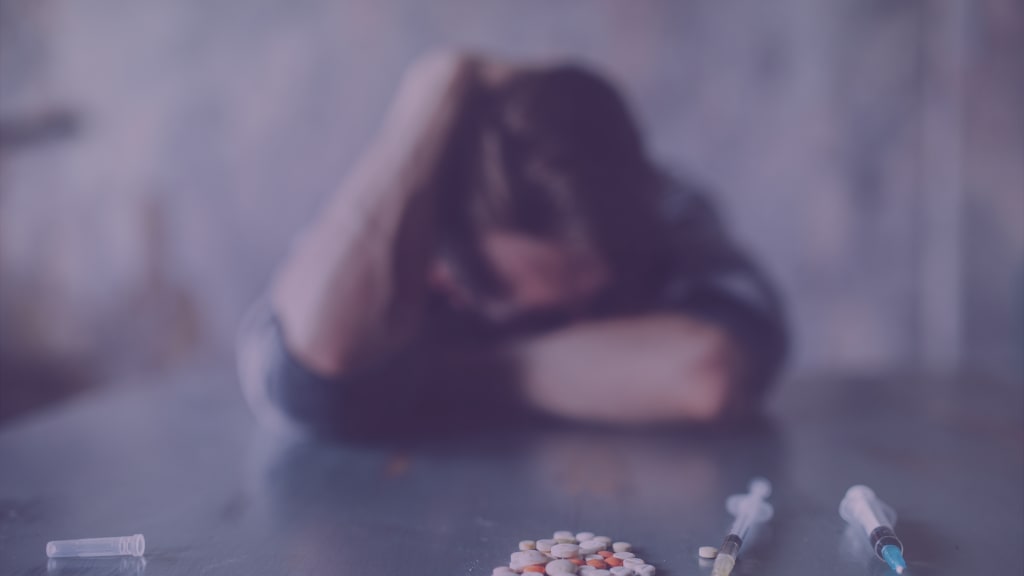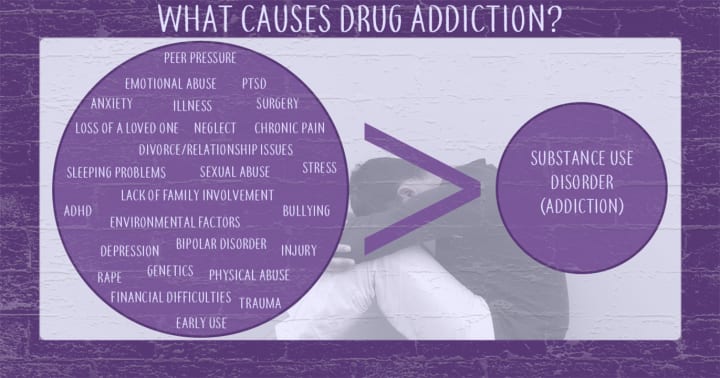Why I Changed my Mind About Addiction
and why you should too

Have you ever looked at someone addicted to drugs with disgust and disdain? Have you ever seen a news article with the words “accidental overdose” and thought “well, if they didn’t use, that wouldn’t be a problem.”? Have you ever thought addiction was a choice that someone made or that they could stop if they wanted to?
I’ve been guilty of all these and more.
That is the stigma that surrounds substance use disorder, more commonly known as “drug addiction.”
I was once very ignorant of anything involving substance use disorder and I got caught up in the stigma. I was guilty of believing what the media spoon-fed me through movies, tv shows, and the news.
My mindset shifted shortly before May 22, 2021.
My wife asked that I do a YouTube video about mental illnesses and how they can affect the family. It was something I never got around to doing (for reasons that will be clear soon) but I did start researching. Not long into my research, I discovered something that completely blew my mind. Something that never crossed my mind: drug addiction is a mental disorder.
Once this revelation hit me, I turned to my wife and told her. You see, her mom struggled with addiction to benzodiazepines, a medication used to treat anxiety. She struggled for the better part of my wife’s life. My wife, like I at the time, had pretty much the same mindset when it came to those addicted to substances. She, much more than I, resented her mom. She hated how her mom treated her when she was coming down from the substances. She hated how “spaced out” her mom got when high on the benzos and whatever else she might have been using. My wife had seventeen years of resentment built up towards her mom because of her addiction.
Her mom died on May 22, 2021, two days after my wife’s thirtieth birthday. Only about two weeks after I learned that addiction was a mental disorder.
The revelation that addiction is a mental disorder did not comfort my wife at first. She felt hurt. She felt betrayed. She missed the mom that made her childhood great. She had now lost her last living parent.
I was the one that found her mom; I was the one that broke the news to my wife. I remember her dropping to her knees and screaming to God to forgive her mom. I remember telling her that her mom was not selfish. Her mom was sick. Her mom was no longer hurting.
Her mom’s death ignited a light in me that I have never felt before. A woman that I didn’t care much for, a woman that I have resented for most of the time I’ve known her. This woman who I had on my phone as “Crazy Lady” helped change my mindset on drug addiction.
After her death, I spent hours and hours researching (and still do) substance use disorder. I have learned things that I have never known, much less thought about. I have heard many heartbreaking stories of people suffering from substance use disorder. I've also heard many heartbreaking stories from the families as well. Parents watching their children suffer. Children watching their Parents suffer. Spouses watching the love of their life suffer.
Substance use disorder is almost nothing like the media portrays it as. Those suffering usually always have something driving their addiction. Addiction is often brought on by trauma, coexisting mental disorders, and other means. Not because they are terrible, selfish people. Unlike Hollywood portrayals, many people suffering from addiction have almost normal lives. You would never see that they suffer. They aren’t all homeless or begging on the streets, although yes, some do. Very few knew of my mother-in-law’s struggles, even her closest friends.
My wife’s mom was a victim of rape. She was also robbed and had many family members, including her husband die. She also suffered from anxiety, depression, ADHD, and no telling what else. We suspect that this is what pushed her to become addicted.
Many who suffer from substance use disorder have similar stories. They have had a major trauma in their life. They live with chronic pain. They suffer from a prior mental illness. They had an injury or surgery for which their doctor prescribed opiates. Despite taking them as prescribed, they, over time, became addicted.

This is what people need to understand about substance use disorder. While there is usually a choice to start using, that choice is almost always backed up with a good reason. Their meds might no longer work, their meds might have run out, or they got cut off from their meds. They might have made the decision to use one single time. When they used it, it made all their pain and suffering go away. Then they used it again and again and before they knew it they became addicted. They never meant for that to happen. No one plans to become addicted.
To better understand substance use disorder you need to understand that continuous use changes the brain. It changes parts of the brain that influence decision-making and willpower, as well as other things. These changes often lead users to commit crimes, such as stealing. It also makes them lack the ability to quit. It’s important to note that many substances release dopamine, the pleasure sensation. This sensation makes users feel rewarded and our brains are wired to repeat actions that please us and make us feel rewarded. It’s hard for anyone to turn that off or ignore it.
Learning what I have so far, and what I have mentioned here only scratches the surface. It is what helped change my mindset about drug addiction. I went from someone who had no sympathy for those addicted to someone that is dedicating their life to raising awareness for them. I am working towards destroying the stigma that surrounds substance use disorder and those suffering from it.
The stigma is massive! There is so much that is misunderstood about addiction and this is what I’m trying to correct. That is why it is important for people to educate themselves on substance use disorder. You can literally save lives by being educated.
There are a lot of lives to save too.
Ten percent of Americans suffer from substance use disorder. That's roughly 26 million Americans and 75-90% of them never get help. Many don’t seek help because of the shame associated with addiction. It's all due to the stigma surrounding SUD. Others don’t get help due to the cost, fear of imprisonment, lack of resources, and many other contributing factors, much of which is due to the stigma surrounding addiction. And, yes, it is even worse for people of color.
To end this, I want you to understand exactly how serious it is getting.
93,331 people died from drug overdoses in the United States in 2020. That was over a thirty percent increase from the 70,630 that occurred in 2019.
This is due to the fact that we are in the middle of the opioid epidemic. To help you understand the impact of opiates; 69,710 (75%) of the overdose deaths in 2020 involved opioids. That’s just shy of the total number of ALL overdose deaths in 2019.
To give you an even greater figure to chew on, there were fewer than 7,200 overdose deaths in 1970 during the height of the heroin epidemic. 93,331. That's a 1,200% increase.
The numbers are still growing. The most recent numbers released by the CDC estimated that 96,779 lives were lost from overdoses between March 2020 to March 2021.
96,779!
Imagine how we could decrease that number if we actually fought to end the stigma surrounding substance use disorder. Imagine how it could actually help those that suffer from it.
My mindset on addiction has greatly shifted in the last few months. I’m hoping your reading this will help change your mindset too.
About the Creator
Randell Gresham
I am a father and a husband that is working to better himself. I am currently working as a manager at a fast food restraunt but working towards my real estate licence to make a better life for my family and to help others.






Comments
There are no comments for this story
Be the first to respond and start the conversation.